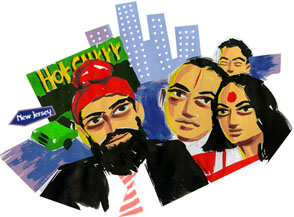
Vijay teaches in the English department in a small American town in Prasenjit Gupta’s short story “A Brown Man”. He is single. His mother in India wants him to marry an Indian girl; no foreigners were to be trusted. So Vijay found Asha his girl friend for three years until she – more liberal in her ways than even the white girls his mother worried about, left Vijay for a hippie.
Vijay is single and lonely and his departmental senior Philip and wife Sharon are good friends and they are trying to act match maker; but that is not going to work for Vijay is very conscious of parental authority and won’t do any thing that will offend his mother, but then Philip and Sharon do not know that of course. So they introduce to Vijay, a distant cousin by the name of Amy who is on a short vocation and staying with them. Vijay is not too interested; remember his mother is wary of white girls out to seduce her son, but out of courtesy to Philip and Sharon who are good people, he agrees to spend some time with Amy and “show her around” the town.
Amy is a good enough girl but Vijay is not interested; he has already been hurt once and remember; his mother has warned him to wary of the white girls. “Don’t bring home a foreigner” was the unambiguous message. Though they go out several times and though they get along well enough, there is no trace of romance. He shares about the Indian girl who left him and she in turn tells him about the boy who left her. Slowly he is falling in love with a white woman despite all the warnings that he has received. On one of his monthly phone calls to his mother, he crosses the Rubicon by telling his mother that he has been seeing a white girl. She sighs into the phone. A sigh of hopelessness.
It is the end of Amy’s vacation and they are going out for their last outing. Amy has never looked more beautiful and Vijay knows that if he must propose, this has to be the night. As they are settling into their meal, a white man comes and sits down opposite their seat and looks disdainfully at him and admiringly at Amy. Vijay shrinks within himself as he remembers the many times he has been snubbed at by white people over the years. The dinner ends with the proposal never uttered and Vijay drives a very visibly low Amy back home. The next day, as Vijay drops Amy to the airport, she casually mentions that her old boy friend wants reconciliation and she was open. Vijay shrivels further inwards as he bids her good bye … for the last time and heads back home.

Is racism for real or is it an imagined shadow that Vijay seems to see every where, often without any substantial basis ? His colleague Philip and his wife Sharon cared enough about him to notice his loneliness and try and do some match making and Amy as she went out with him, evening after evening dared to hope that the man she had come to love and to admire would one day propose to her. But though he skirted edgily around the subject, he never did. He was haunted by his own mother’s demons – that white American girl was bad though Vijay’s own experience was to have been let down by an Indian girl trying hard to be “Western”.
Now that racism is no longer institutionalized, it is obviously that much more difficult to track down and identify. And how much of it is real and how much of it is magnified by past experiences, mental imagery, perceptions –true and imagined that we end up interpreting wrongly and often with tragic consequences as happened with Vijay? Vijay’s interpretation of what a white woman would be like was largely conditioned by what his mother whispered on the phone as they talked every month and indeed in India, even before he had left the country’s shores to go to America. Although he had enough caring white people in his life, he still could not bring himself to trust himself and trust them when it came to the defining moment of his life and that moment eventually passed him by.
We talk often of stereotyping – racial and ethnic and religious and others and imagine that these flawed judgments that we make of others harm them, discriminate against them, and deny them opportunities….. But stereotyping is actually like a boomerang it comes back and denies us the very same joys that we imagine others are losing out on.


No comments:
Post a Comment